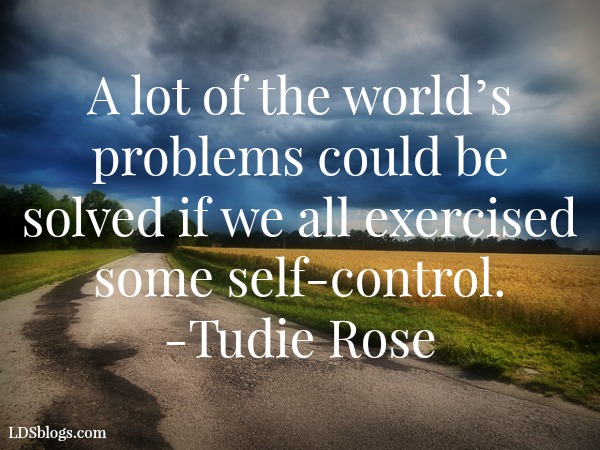The life of self-control is not grievous but joyous when we become accustomed to it. It clears the mind; it strengthens the judgment; it elevates the character. It is the true freedom. —Benjamin Jowett
As I read this quote, it occurred to me that a lot of the world’s problems could be solved if we all exercised some self-control. Wars are often started because of greed or anger, both which could be controlled. Road rage happens when someone loses control. Air, water, and the earth in general are polluted when we selfishly roam the planet without self-control. Divorce happens and families split apart because anger or appetites aren’t controlled. Child abuse, spousal abuse, elderly abuse—all are products of the lack of self-control.
So what is self-control, why is it important, and how can we master it?
What Is Self-Control?
Merriam-Webster Online Dictionary defines self-control as “restraint exercised over one’s own impulses, emotions, or desires,” giving as some synonyms the terms “self-discipline, self-government, self-mastery, self-possession, self-restraint, willpower” (http://www.merriam-webster.com/dictionary/self-control).
In other words, self-control is the ability to see the bigger picture and stop actions, attitudes, or speech destructive to one’s self or others.
Self-control is also called self-discipline. Sadly, control and discipline are fast becoming extinct in modern society.
By “moral discipline,” I mean self-discipline based on moral standards. Moral discipline is the consistent exercise of agency to choose the right because it is right, even when it is hard. It rejects the self-absorbed life in favor of developing character worthy of respect and true greatness through Christlike service (see Mark 10:42-45). The root of the word discipline is shared by the word disciple, suggesting to the mind the fact that conformity to the example and teachings of Jesus Christ is the ideal discipline that, coupled with His grace, forms a virtuous and morally excellent person.
The societies in which many of us live have for more than a generation failed to foster moral discipline. They have taught that truth is relative and that everyone decides for himself or herself what is right. Concepts such as sin and wrong have been condemned as “value judgments.” As the Lord describes it, “Every man walketh in his own way, and after the image of his own god” (D&C 1:16).
As a consequence, self-discipline has eroded and societies are left to try to maintain order and civility by compulsion. The lack of internal control by individuals breeds external control by governments. One columnist observed that “gentlemanly behavior [for example, once] protected women from coarse behavior. Today, we expect sexual harassment laws to restrain coarse behavior (D. Todd Christofferson, “Moral Discipline”, Oct. 2009 General Conference).
I spent many years as a legal secretary, and I agree with Elder Christofferson that laws are constantly being put on the books to control actions that several generations ago we considered common sense issues. Many years ago as a young legal secretary, I worked on a lawsuit where the manufacturer of a candy machine was being sued for products liability because a child had reached up into the machine to steal a candy bar and was electrocuted. I was only about 20 years old at the time, and it bothered me that it never occurred to anyone that there are consequences for lack of self-control in the honesty department. Candy machines are now designed with what I call “dishonesty guards” so that children (and adults) no longer have to use self-control to keep from stealing and being electrocuted. While it is a good thing that no one else will be hurt, we’ve removed one more area of choice and accountability for our society. If we wonder why people can’t control themselves, we need to look at whether or not we are giving society a chance to practice it.
Why Is Self-Control Important?
People who are happy in their family life and employment are those who have learned at least in some degree the art of self-control. If you are continually exploding to your spouse, children, co-workers, boss, neighbor, drivers on the road, or the crazy person in the grocery store, the chances are that you aren’t going to end up very happy. Those who can’t monitor and restrain their actions don’t end up to be leaders and are usually not successful in business or in home life. Simply put, the lack of self-restraint significantly puts a damper on happiness and success.
How Can We Master Self-Control?
My dad always said you can make a game out of anything, so I was tickled when I ran across Bruce Bower’s suggestions or “secrets” to self-control below.
Three secrets to self-control
- Distract yourself . . . make up stories in [your head], sing songs or invent games to play.
- Make if-then plans and stick to them. Examples: If there is a dessert menu at the restaurant, I will not order chocolate cake. When the clock hits 5 p.m., I will read my textbook.
- Shift your time perspective from immediate desires to future negative consequences. A smoker pining for a puff can visualize himself as a cancer patient being wheeled into radiation treatment (Bruce Bower, Science News, “Mastering the Art of Self-Control”, Nov. 3, 2014).
Mastering self-control, or self-discipline really isn’t all that complicated. We can do anything if we put our minds to it. It is a matter of deciding to make it a priority. If today’s society is any indication, I think we should all be making it a priority. Mastering self is nothing more than mastering good behavior and good manners. Oh that there were more of that in the world!
Moral discipline is learned at home. While we cannot control what others may or may not do, the Latter-day Saints can certainly stand with those who demonstrate virtue in their own lives and inculcate virtue in the rising generation (“Moral Discipline”, Ibid.).
What will you do this week to more fully be in control of yourself? Do you believe that by mastering yourself you will be a happier person?
About Tudie Rose
Tudie Rose is a mother of four and grandmother of ten in Sacramento, California. You can find her on Twitter as @TudieRose. She blogs as Tudie Rose at http://potrackrose.wordpress.com. She has written articles for Familius. You will find a Tudie Rose essay in Lessons from My Parents, Michele Robbins, Familius 2013, at http://www.familius.com/lessons-from-my-parents.
Twitter •








